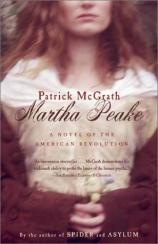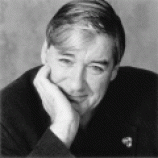Excerpt
Excerpt
Martha Peake: A Novel of the Revolution

Chapter One
It is a black art, the writing of a history, is it not?--to resurrect the dead, and animate their bones, as historians do? I think historians must be melancholy creatures, rather like poets, perhaps, or doctors; but then, what does it matter what I think? This is not my story. This is the story of a father and his daughter, and of the strange and terrible events that tore them apart, so it is to those two unhappy souls that I would direct your gaze. As for me, I shall soon sink from sight, and you will forget me altogether. No, I am merely the one who happened upon the story, as you might happen upon, say, a cache of letters in the attic of an ancient uncle's country house; and blowing away the dust of decades, and untying the ribbon that binds them, finding within those crumbling pages a tale of passion so tragic, yet so sublime--as to transform, in that instant, the doddering relict in the bath-chair below to a spirited youth with a fiery heart and the blood of a hero racing in his veins!
Now in those days, as it happens, I did indeed have an ancient uncle, and for some time I had been aware that his health was failing; and being his only surviving relation, I had speculated that his property would come to me when he passed on. The old man had been living a life of seclusion ever since the death of his benefactor, the great anatomist Lord Drogo, so when I received his letter, asking me to come to him at once, I wasted no time. I need not describe to you the journey I took across the Lambeth Marsh, nor the house itself, for both Drogo Hall and its drear landscape will emerge strongly in what follows. Suffice to say that I rode across the marsh alone, and carried a loaded pistol with me; and upon arriving at dusk, I was admitted by a little bent man called Percy, who took me up the great staircase to my uncle's study and then vanished without a word.
I found the old doctor seated close to a blazing coal fire in a small gloomy room with a heavy Turkey carpet on the floor and thick dark curtains on the windows. He had a blanket on his knees, a tome in his lap, and a jorum of Hollands-and-water close to hand. As he turned toward the door I saw at once that he could not be long for this world, so frail did he appear, his skin in the firelight as white and brittle as paper. But on recognizing me a light came up in those dim and milky eyes, he fixed me with a gimlet stare and cried to me to come in--come in, for the love of God!--for the draft was a chill one; and he pointed with a trembling finger to the aged leather armchair on the other side of the fireplace.
But still I stood there in the open door, rooted to the spot. I was transfixed by the painting hanging over the mantelpiece. I had never seen it before. It was the portrait of a robust, broad-shouldered man of between thirty and forty years. He stood against a wild moorland scene, a pine flattening in the gale on the brow of a distant hill, and rags of black cloud flying across the sky. He wore neither hat nor wig, and his long hair was tied at the back with a blue ribbon, a few strands torn free by the wind. His shirt was open at the throat, his skin was pale, and his eyes were like great dark pools, full of life and full of pain but hooded, somehow, lost in shadow as they gazed off into some unknown horizon. It was not a handsome face, it was carved too rough for that, but it was a strong, complicated face, hatched and knotted with sorrow and passion, a big stubborn chin uplifted--the whole head uplifted!--lips unsmiling and slightly parted, and the expression one of defiance, yes, and purpose. I felt at once that the artist, for all that he had caught some fleeting expression of this fierce, romantic spirit, could not have done him justice, nobody could have done justice to this man. My uncle William nodded at me with a pursed smile as I closed the door behind me and moved to the chair by the fire, my gaze still fixed on the painting, and slowly sat down.
"You know who he is, eh?"
"No, sir," I said, "I do not."
"No? Then shall I tell you?"
It was Harry Peake. The name clawed at the skirts of memory as I sat down by the fire and warmed my jaded heart on the image of that proud rough man. America--for some reason as I gazed at him I thought of America--I thought of the Revolutionary War, and of all that I had learned of that great conflict from my mother, herself an American who pined in exile for her country every day of my childhood. An incident by the sea--a burning village filled with women and children--a red-haired girl with a musket at her shoulder--these ideas tentatively emerged from out of the mind's mist, but all else remained shrouded and obscure. I found myself sitting forward in my chair and staring into the fire as I tried to remember. At last I looked up, and told my uncle I saw a village in flames somewhere on the coast of North America, but no more than that. For some moments there was little sound in the room but the hiss of the coal in the hearth, and the wind rising in the trees outside.
"Come, Ambrose, sit closer to the fire," he murmured at last, turning away from me, seizing up the bottle of Hollands at his elbow. "Here, fill your glass. You shall hear it all. I have held it in my heart too long. It has blighted me. I am withered by it. He never got to America. God knows he wanted to."
My uncle put his fingertips together beneath his chin and closed his eyes. Silence.
"Many a man," I murmured, "has never got to America."
A sort of sigh, at this, and then silence again. I waited. When next he spoke it was with a clipped asperity that belied the desperate pathos of what he told me. To know Harry Peake, he said, you must first know what he suffered. Then you will understand why he fell. Why he turned into a monster.
"A monster--!"
" 'Even brutes do not devour their young, nor savages make war upon their families'--eh?" He was quoting an author, but I missed the allusion.
"He devoured his young--?"
Then I had it. Tom Paine.
"Lost his mind. What a waste. What a mind."
"But who was he?"
Here my uncle turned to me, and again fixed me with that gimlet eye. "One of those cursed few," he said, "to whom Nature in her folly gave the soul of a smuggler, and the tongue of a poet."
And so it began. Much of the detail I have had to supply from my own imagination, that is, from the ardent sympathetic understanding of the tragic events my uncle William described. His recall was patchy, for time had worn his memory through as though it were an old coat. The seams had split open, there were fragments of alien fabric, rudely stitched, and everywhere the pattern was obscured by foreign substances, such as those that were liberally splattered about the papers I later received from him, blood, soil, gin, etc. So I was forced to expand upon the materials he gave me. But when it was over I felt that I understood, I understood the extraordinary life not only of Harry Peake, but of his daughter also, of Martha Peake, who died at the hands of her own countrymen, and who, by her sacrifice, helped to create the republic to which my mother swore allegiance, and whose spirit I have come to love.
Later that evening the wind came up, it started to rain, and I was glad indeed of the shelter of Drogo Hall, for I had no desire to be out on the Lambeth Marsh in such conditions. We supped in the grand dining room downstairs, and a strange meal it was, the two of us up at the end of the table, a single branch of candles to light us, the wind howling about the house and that peculiar little man Percy, now wearing a ratty scratch wig, presumably on account of the formality of the occasion, serving us with silent swiftness, appearing suddenly out of the darkness with tureen or decanter and just as suddenly vanishing again. From the high, dark-panelled walls of the dining room the portraits of the earls of Drogo of centuries past peered down at us through the gloom, and our con- versation seemed at times to struggle forward as though burdened by the span of years that separated us from the events of which we spoke, indeed that separates me now from that dismal stormy night so long ago.
My uncle sat in the great chair at the head of the table, a tiny slumped figure against the vast gloom behind him, and picked at his food with sharp little jabs like a bird. We ate cold mutton and boiled potatoes. He had frequent recourse to the decanter, which was filled with a sweet Rhenish wine, and with every glass his speech grew more fluting, more rapid, and more inflected with the fancies of a failing mind, such that I had constantly to steer him away from the wild places where he seemed inclined to wander, and back to the track of his narrative. And all the while the silent Percy flickered in and out of the candlelight like a moth, again and again refilling my uncle's tall crystal goblet with that undrinkable sweet white wine.
Oh, we talked on long after the last dish had been removed, and the candles had burned down to guttering stubs, and still the wind could be heard out on the marsh, and the boughs of the trees slapped against the high windows of the house. Later I made my way upstairs with a candle, to a cold room with a damp bed where I lay sleepless for many hours as the storm exhausted itself and I attempted to digest not only my uncle's mutton but his story as well.
Martha Peake: A Novel of the Revolution
- paperback: 384 pages
- Publisher: Vintage
- ISBN-10: 0375701311
- ISBN-13: 9780375701313



